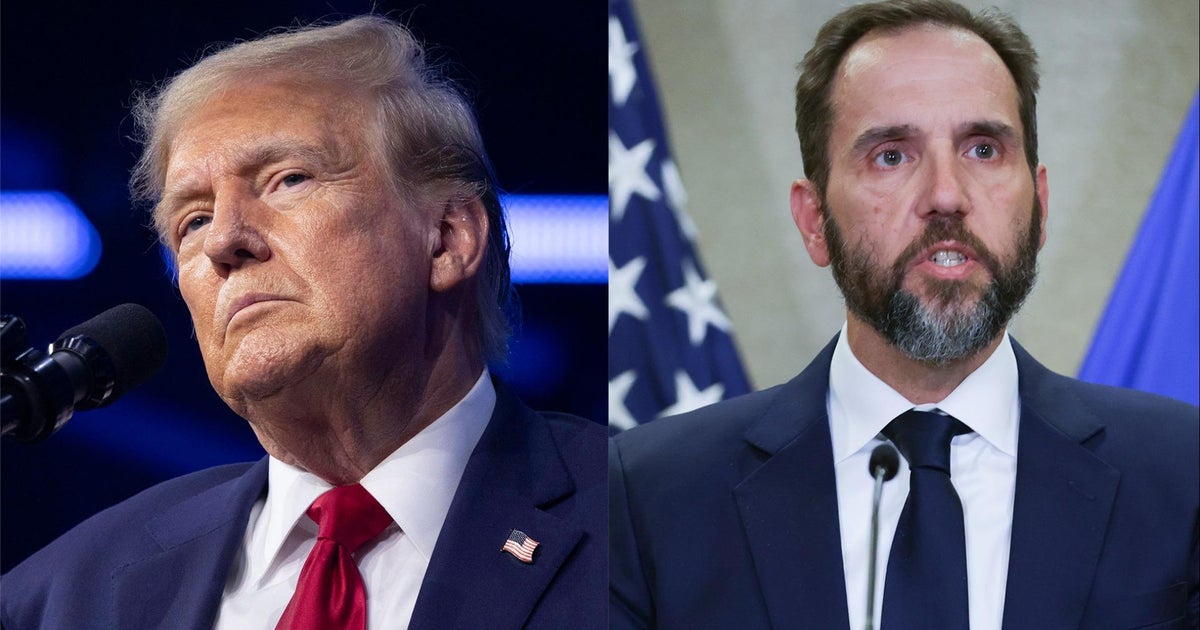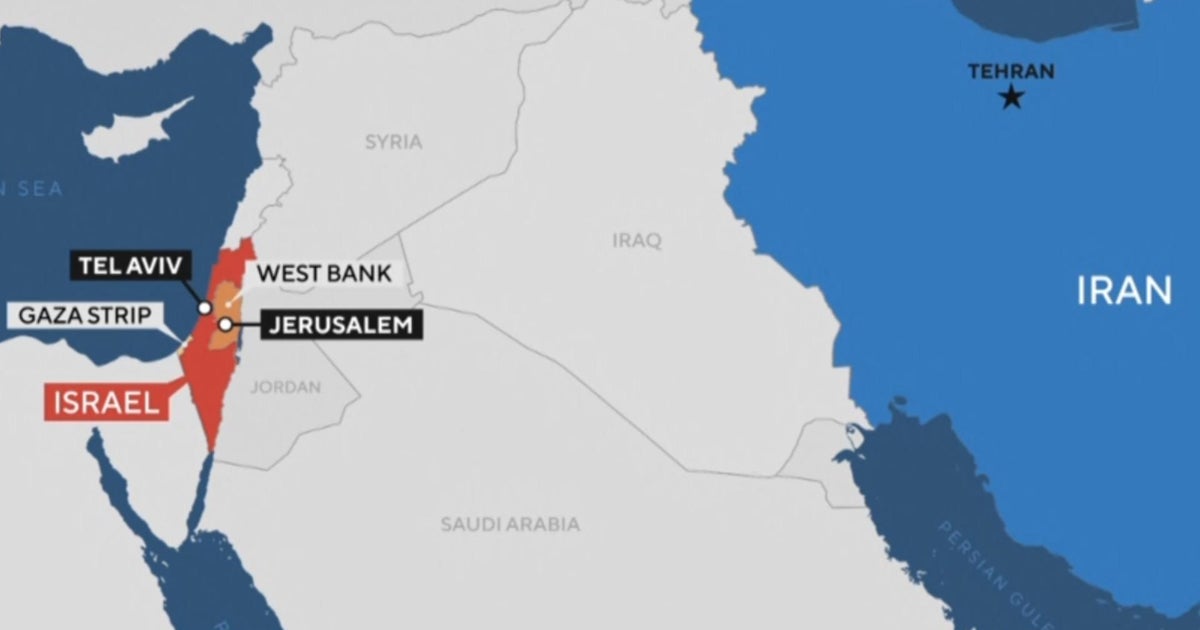CBS News
Fifth group of hostages released after Israel and Hamas agree to extend cease-fire

Twelve more hostages who were held in Gaza were released on Tuesday, according to the Red Cross and the Israel Defense Forces, after a humanitarian pause in fighting between Hamas and Israel was extended on Monday for an additional 48 hours. Red Cross representatives transferred the 12 hostages to Egypt, the IDF said.
In exchange, 30 Palestinians were released from Israeli prisons — 15 minors and 15 women, Dr. Majed Al-Ansari, spokesperson for Qatar’s Ministry of Foreign Affairs, said in a statement.
The announcement came after dozens of Israeli hostages and more than 100 Palestinian prisoners were released on Monday and over the weekend, including the first American hostage released by Hamas, 4-year-old Abigail Mor Edan. The Israeli-American girl was also the youngest American being held hostage.
On Monday, National Security Council spokesperson John Kirby confirmed a two-day extension of a cease-fire in the Gaza Strip, which began on Friday and was initially set to last four days, as part of a truce deal between Israel and Hamas negotiated by the U.S., Qatar and Egypt. It hinged on Hamas’ pledge to release at least 50 women and children taken captive in Israel on Oct. 7, and Israel’s pledge to release at least 150 Palestinian women and children detained in Israeli prisons. Israel also agreed to adhere to a cease-fire agreement in Gaza.
The temporary pause in fighting was the first since Israel declared war on Hamas in the aftermath of militants’ deadly rampage on Oct. 7, which Israeli officials have said killed 1,200 people. Hamas kidnapped an estimated 240 people from Israel and held them captive in Gaza in the aftermath of Hamas’ rampage, according to the officials.
Mediating country Qatar announced that Israel and Hamas had reached a deal to extend the cease-fire for another 48 hours on Monday, ahead of the original deal’s expected expiration at 7 a.m. local time on Tuesday morning. Israel had previously said it would be willing to extend the cease-fire in Gaza, much of which has been decimated by Israeli military airstrikes in the wake of Oct. 7, if Hamas agreed to free additional hostages. Israel had said it would honor an additional day of the cease-fire for every 10 additional hostages released by Hamas.
On Monday, Kirby said at a news briefing that Hamas had agreed to release 20 additional hostages over the two-day extension that followed. He said there was also work being done to further extend the cease-fire.
The Israeli government released a list of 50 more Palestinian prisoners that it said could be released as part of continued exchanges. A spokesperson for the Israeli government, Eylon Levy, told the media on Tuesday that “the current hostage release pause can be extended for another five days on the basis of the three for one swap,” meaning three Palestinian prisoners would be released from Israel for every hostage released by Hamas.
“Once Hamas stops returning hostages, we will resume the military pressure on Hamas until it releases more of them,” Levy said.
The hostages released by Hamas since Friday have so far been women and children. The militant group, designated a terrorist organization by the United States and Israel, told CBS News on Monday that it was interested in negotiating another deal that would further extend the cease-fire and include the release of male hostages and abducted Israeli soldiers.
A U.S. official confirmed to CBS News on Tuesday that CIA Director William Burns was in Doha for meetings on the Israel-Hamas conflict, including discussion about the hostages.
Israel says around 170 people remain captive in Gaza, but Hamas says some of them are being held by other groups. The Biden administration says it will work on securing more extensions to the cease-fire until all the hostages are released.
CBS News
Trump argues Smith unlawfully appointed in documents and election cases

Washington — Former President Donald Trump urged two separate federal courts to toss out the criminal charges brought against him by special counsel Jack Smith, arguing in both instances that Smith was unlawfully appointed and did not have the legal backing to prosecute the cases.
Trump’s requests were made to the federal district court in Washington, D.C., which is overseeing the case stemming from the 2020 election, and the U.S. appeals court in Atlanta, which is reviewing a lower court ruling that dismissed the separate case that arose out of the former president’s alleged mishandling of documents marked classified.
In the case in Washington, Trump is seeking to file a motion to dismiss the four criminal charges brought against him based on the legality of Smith’s appointment of special counsel. A district court judge in South Florida, who is overseeing the documents case, ordered an end to that prosecution in July after she found Smith was unconstitutionally appointed and funded.
The special counsel appealed that decision earlier this year, arguing U.S. District Judge Aileen Cannon ruled incorrectly. He is expected to also oppose Trump’s bid to toss out the charges stemming from what prosecutors allege was an illegal effort by the former president to hold onto power after the 2020 election.
The documents case
The federal appeals court is set to decide whether to revive Smith’s prosecution of Trump over his handling of sensitive government records and alleged attempts to obstruct the Justice Department’s investigation.
But in a filing with that court, the U.S Court of Appeals for the 11th Circuit, submitted Friday, Trump’s legal team argued the ruling from Cannon, who was appointed by the former president, was sound and should stand.
“There is not, and never has been, a basis for Jack Smith’s unlawful crusade against President Trump,” his lawyers wrote. “For almost two years, Smith has operated unlawfully, backed by a largely unscrutinized blank check drawn on taxpayer dollars.”
They argued the appeal involved issues that present risks to the institution of the presidency and said the district court’s decision was correct based on text, history, structure and practices.
Prosecutors allege Trump kept sensitive government documents at his South Florida property, Mar-a-Lago, after leaving the White House in January 2021 and stymied government efforts to retrieve the records. The special counsel also charged Trump and two employees with impeding the federal investigation. He and his two co-defendants, Walt Nauta and Carlos de Oliveira, pleaded not guilty. Cannon dismissed the charges against all three defendants.
The FBI recovered more than 100 documents bearing classification markings during a court-authorized search of Mar-a-Lago in August 2022 and prosecutors later revealed that boxes of records were kept on a stage in the estate’s ballroom, in a bathroom and shower, and in a storage room.
Trump has claimed that the criminal case against him is politically motivated and denied wrongdoing. He sought to dismiss the indictment on numerous grounds, including the argument that Smith didn’t have the legal authority to file the charges at all because of the way Attorney General Merrick Garland appointed him in 2022.
The former president’s legal team argued Smith’s independent position within the Justice Department violated the Constitution. But Smith’s team pushed back, arguing in court filings that the naming of a special counsel was backed by Justice Department precedent that had been validated in previous cases by other federal courts.
The most recent involved the appointment of Robert Mueller in 2017 to oversee an investigation into Russia’s efforts to interfere in the 2016 presidential election. The federal appeals court in Washington, D.C., upheld Mueller’s appointment in 2019.
Cannon held several days of arguments in June to consider the constitutionality of Smith’s appointment before issuing her decision tossing out the 40 charges the former president faced.
“The bottom line is this: The Appointments Clause is a critical constitutional restriction stemming from the separation of powers, and it gives to Congress a considered role in determining the propriety of vesting appointment power for inferior officers,” she wrote. “The special counsel’s position effectively usurps that important legislative authority, transferring it to a head of department, and in the process threatening the structural liberty inherent in the separation of powers.”
In addition to finding that Smith’s appointment violated the Appointments Clause, Cannon said the special counsel’s office has been drawing funds from the Treasury without statutory authorization in violation of the Appropriations Clause.
Cannon’s decision — and Trump’s filings — cited a concurring opinion from Justice Clarence Thomas in the 2020 election case involving Trump, which he sought to dismiss on the grounds of presidential immunity. The Supreme Court ruled former presidents are shielded from prosecution for official acts taken while in the White House, and Thomas wrote separately to question the legality of Smith’s appointment. No other justice joined Thomas’ opinion and it is not binding.
Smith asked the 11th Circuit to review Cannon’s decision and resurrect the case against Trump, arguing the special counsel was “validly appointed” by the attorney general and properly funded.
“In ruling otherwise, the district court deviated from binding Supreme Court precedent, misconstrued the statutes that authorized the special counsel’s appointment, and took inadequate account of the longstanding history of attorney general appointments of special counsels,” prosecutors said in their opening brief to the appeals court.
The question of whether Smith was lawfully appointed could end up before the Supreme Court.
The 2020 election case
Proceedings in the election case in Washington had been on hold for months while the Supreme Court weighed whether Trump was entitled to immunity from prosecution, but they resumed in September. In the wake of the high court’s decision, a federal grand jury returned a superseding indictment that charged Trump with four felony counts but narrowed the allegations against him to comply with the high court’s new framework for presidential immunity.
Trump pleaded not guilty. He is expected to again seek to have the case dismissed on immunity grounds, but in a filing Thursday, also argued that the charges should be tossed out because Smith was unlawfully appointed. The former president also wants the judge to prohibit the special and his office from spending any more public dollars.
“Everything that Smith did since Attorney General Garland’s appointment, as President Trump continued his leading campaign against President Biden and then Vice President Harris, was unlawful and unconstitutional,” Trump’s lawyers wrote.
They said their proposed motion to dismiss the indictment “establishes that this unjust case was dead on arrival — unconstitutional even before its inception.”
Trump’s team argued that Smith’s appointment is “plainly unconstitutional” because he was not nominated by the president and confirmed by the Senate.
As to the special counsel’s funding, the defense claimed that Smith has been operating with a “blank check.”
Smith is expected to have a turn at bolstering his appointment in the coming weeks and will likely echo the defenses he deployed in the classified documents case.
Chutkan, as a federal judge in Washington, does not have to adhere to the ruling in Trump’s other prosecution and has indicated she disagrees with Cannon’s conclusion that Smith’s appointment was outside constitutional bounds.
During a September hearing, Chutkan said she didn’t find that ruling to be “particularly persuasive” and noted she is bound by the 2019 decision from the D.C. Circuit upholding an earlier special counsel appointment.
Trump is vying for a second term in the White House and has said he would fire Smith “within two seconds” if he defeats Vice President Kamala Harris in the presidential election.
CBS News
From the archives: VP Dick Cheney on potential 2003 invasion of Iraq

Watch CBS News
Be the first to know
Get browser notifications for breaking news, live events, and exclusive reporting.
CBS News
From the archives: President George W. Bush on “Face the Nation” in 2006

Watch CBS News
Be the first to know
Get browser notifications for breaking news, live events, and exclusive reporting.









